America Is Authoritarian by Design
One by one, each of our institutions has fallen victim to minority rule. Our faith in the Constitution has been grossly misplaced.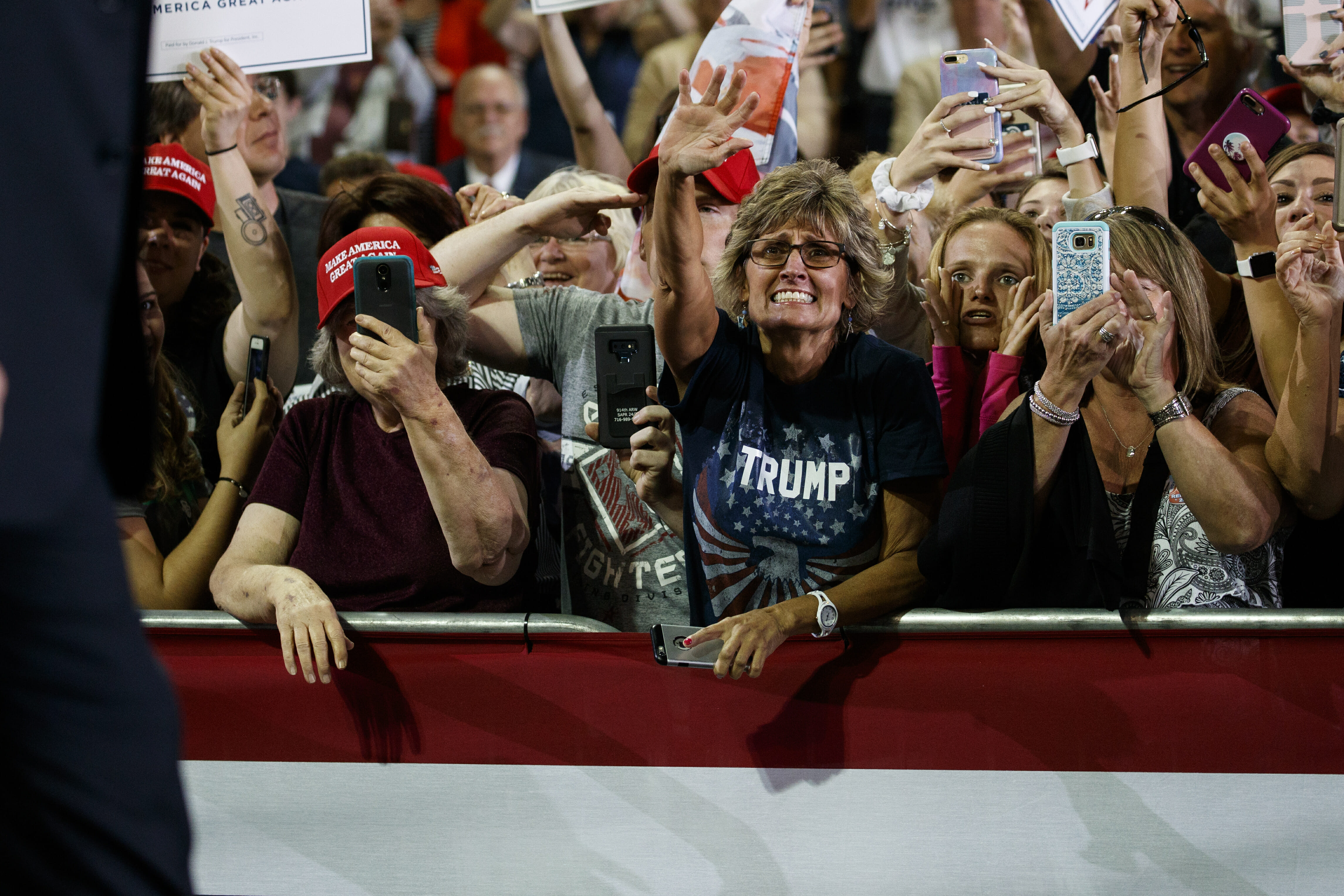 Supporters cheer President Donald Trump as he arrives at a campaign rally in Erie, Pa. (Evan Vucci / AP)
Supporters cheer President Donald Trump as he arrives at a campaign rally in Erie, Pa. (Evan Vucci / AP)
So often, underlying structures and institutions of oppression escape serious scrutiny amid our country’s most high-profile political dramas. Take the recent conviction of Jason Van Dyke, the white Chicago police officer caught on tape four years ago firing 16 shots into 17-year-old Laquan McDonald.
From its soul-numbing kill tape to McDonald’s family shown and quoted repeatedly across local media, the trial’s coverage took on an almost theatrical tone. We heard from the victim’s family members, the officer’s wife, and the activists celebrating the verdict in the streets. Television cameras zoomed in on the sorry face of the sad killer, right up to the moment he was led out of court as a convicted murderer.
Largely left unsaid was how Van Dyke’s crime was merely a ripple—if an especially provocative one—in a deep sea of racial oppression engulfing Chicago and the nation as a whole.
Before the trial concluded, a veteran Chicago activist and radical commentator told me he’d heard that “Van Dyke will be thrown to the mob” as “a kind of token” to pacify the city’s black population and take the heat off a racist police state. Indeed, the danger of the McDonald-Van Dyke drama and its guilty verdict is that it will function as a safety valve, helping the city and nation’s entrenched racist patterns and institutions maintain their legitimacy, helping spread the illusion that the “system works.”
But it doesn’t work for millions of disproportionately poor black people. Ask the families of Milton Hall, Mike Brown, Eric Garner, Freddie Gray, Tamir Rice, Rekia Boyd, Sandra Bland and the growing list of mostly young African-Americans unjustly killed by American police officers and prison and security guards—all on tape. Ask the hundreds of black Chicagoans who have been terrorized into signing forced confessions for crimes they didn’t commit. Ask the many thousands of black people serving long sentences in Illinois prisons after they were convicted for drug crimes—the type of crimes that whites commit more frequently and without remotely comparable rates of arrest and prosecution.
Ask the millions of black people living in American communities where jobs and doctors’ offices, green spaces and full-service grocery stores, decent public schools and mental-health facilities, public libraries, sit-down restaurants and countless other public and private resources are unavailable—and where police forces (see this 2017 Department of Justice investigation of the Chicago Police Department) function like an invading army of marauding terrorists, a grave threat even to children.
Look at the persistence of huge black-white disparities in income, wealth, poverty, joblessness, health, education, home-ownership, surveillance, arrest, sentencing, incarceration, criminal marking (the “new Jim Crow” of racially disparate felony branding), voter disenfranchisement and more across the U.S.
The repressive policing practices that Van Dyke took to a shocking level are all about keeping blacks savagely separate and unequal. He was tried and convicted only because his crime was caught on tape and exposed through the dedicated efforts of independent activist-journalists and street protesters.
Those activists who helped bring Van Dyke to justice know this all too well. A young Chicago black man interviewed by one television reporter downtown during the “celebration” march said he had “no sense of victory.” The city still feels to him like “a prison” where he’s constantly under the watchful eye of the police, especially when he steps outside of the inferior parts of town to which most black Chicagoans are residentially consigned.
It’s for not nothing that the post-verdict marchers tempered celebratory chants (“We Made History!” and “The People, United, Will Never be Defeated,” for example) with chants noting that it’s “the whole damn system” that must be taken down. Van Dyke may be headed for prison, but they are aware that the racial oppression that plagues “global Chicago” and the nation is still very much intact.
A second case in point is the passion play that unfolded last spring over creeping fascist Donald Trump’s vicious policy of separating migrant children from their parents as they cross the southern border. Cable news viewers saw highly emotional and personalized reporting on the trauma inflicted on Latinx families. Trump and the Immigrations and Customs Enforcement (ICE) agency were portrayed in a most unfavorable light, eliciting liberal and progressive outrage along with activist action that led to the reunification of many of the families torn apart by the Trump administration’s cruelty.
Beyond these dramatic stories, media consumers heard the usual timeworn calls for “comprehensive immigration reform” and clear “paths to citizenship.” Notice, however, what escaped critical examination. As during its breathless coverage of the “unaccompanied minor” migration crisis in 2014, the corporate media this year has had little to say about the following ways in which the United States has helped make Mexico and Central America unlivable for many of its people:
- Flooding these nations with cheap, subsidized U.S. agricultural exports, devastating campesino communities in the name of “free trade.”
- Using so-called free trade agreements to force the privatization of government enterprises, the deregulation of corporations, the slashing of social budgets and the displacement of communities by foreign mining projects.
- Intensifying drug gang violence and power by advancing the militarized “War on Drugs.”
- Accelerating climate change, which has ravaged Central American coffee and corn production.
- Funding and equipping authoritarian and violent, mass-murderous “Third World fascist” regimes (including a right-wing junta the Obama administration helped install in Honduras toward the beginning of 2009) and forces allied with U.S. and business interests in Central America.
Thanks to the media’s failure to provide any of this essential historical-hemispheric context, the great majority of Americans are unaware that the United States has a moral obligation to take in and otherwise assist Central American immigrants and refugees seeking to escape situations made hopeless by U.S. intervention and policy.
A third example is the recently completed and all-consuming melodrama over Trump’s successful elevation of the openly partisan and reactionary thug Brett Kavanaugh to the U.S. Supreme Court. There was some early discussion of Kavanaugh’s role as a crafter of legal “justifications” for George W. Bush’s torture practices, his position on behalf of U.S. presidents’ immunity from prosecution (likely the reason Trump nominated him in the first place) and a past ruling of his indicating that he will tip the high court against Roe v. Wade. Soon, however, the confirmation spectacle was overshadowed by Kavanaugh’s horrific behavior as a late adolescent and young man, as well as his lies about his past as a serial drunk and alleged sex offender. The nation sat riveted as Kavanaugh faced off in a television showdown with a woman, Dr. Christine Blasey Ford, who had accused him of attempted rape.
It is disgusting almost beyond words that a likely sexual predator and obvious dissembler will render judgment on matters of solemn legal, political and societal relevance for a generation. But as troubling as Kavanaugh’s personal history and untruthfulness are, it’s been even more troubling to see them render important questions about abortion rights, presidential immunity from prosecution, and torture virtually meaningless.
Equally distressing has been our continuing failure to address the authoritarian absurdity of essential political and judicial institutions crafted by 18th-century slave owners and merchant capitalists for whom self-governance was the ultimate nightmare. Why in the name of anything remotely akin to democracy should Kavanaugh and his eight high court colleagues hold these powerful positions for life? That constitutionally ordained silliness is owed to the slave-owning Founders’ stern determination to “check and balance” popular rule.
How does a right-wing Republican majority in the U.S. Senate get to confirm a militantly anti-democratic, sexist and partisan hack to the highest court in the land when U.S. public opinion stands well to the left of both Kavanaugh and the GOP on countless policy issues, including union rights, affirmative action, environmental regulation, campaign finance, abortion, the need for viable third and fourth parties, gun control, same-sex marriage, taxation and more? This can happen in no small part because the ludicrously venerated U.S. Constitution assigns two U.S. senators to each U.S. state, regardless of differences in population.
Red Wyoming, home to more than 573,720 Americans, holds U.S. senatorial parity with blue California, where 39.5 million Americans reside. That’s one U.S. senator for every 19.5 million Californians versus one U.S. senator for every 287,000 Wyoming residents.
Just one of New York City’s five boroughs, Brooklyn, has 2.6 million people. If Brooklyn were a state and U.S. senators were apportioned there at the same populace-to-senator ratio as Wyoming, Brooklyn would have nine U.S. senators. (It’s unlikely that a single one of them would be a Republican.)
The following 13 states together have a combined population of roughly 34.4 million: Alaska, Arizona, Arkansas, Idaho, Iowa, Kansas, Louisiana, Mississippi, Nebraska, Oklahoma, South Dakota, Utah and Wyoming. Together these 13 red states send 26 Republicans to the U.S. Senate. California, with 5 million more people than these 13 states combined, sends two Democrats to the upper chamber of Congress.
The predominantly Democratic and half-black District of Columbia is home to 693,972 people, more than all of Wyoming and just 46,000 fewer than that of Alaska. That it is denied a single U.S. senator and serious representation in the House of Representatives is preposterous.
This profoundly undemocratic apportionment system means that the Republican Senate majority answers to a disproportionately white, rural and reactionary section of the electorate. Due to “a growing population shift from the agricultural interior to crowded corridors along the coast,” journalist Daniel Lazare noted last year, it is mathematically possible now to “cobble together a Senate majority with states that account for just 17.6 percent of the popular vote.”
Other such anti-democratic traditions include, but are not limited to:
- An Electoral College that “triples the clout of the eight smallest states and doubles that of the next six” (Lazare). This ridiculous system has ensured that two (2000 and 2016) of the last five presidential elections have gone to the popular vote loser.
- Rampant gerrymandering that tilts state legislatures and the House of Representatives far to the right of the populace.
- Strictly scheduled and time-staggered elections, combined with absurd propaganda telling Americans that they get real and significant policy “input” by selecting from a narrow spectrum of major-party contenders once every 730 or 1,460 days.
- A Supreme-Court-mandated campaign finance system that, according to political scientists Martin Gilens and Benjamin Page, all but guarantees government policy reflects the “wishes of those with money, not the wishes of the millions of ordinary citizens who turn out every two years to choose among the pre-approved, money-vetted candidates for federal office” (emphasis added).
The openly plutocratic domination of U.S. politics (explicitly validated in the Supreme Court’s 1976 Buckley v. Valeo and 2010 Citizens United decisions) is no small part of why the Democrats function as a dismal, corporate-centrism in the face of the Republicans’ horrifying drift toward an Amerikaner fascism.
Meanwhile, the Republican Party’s control of all three branches of federal government makes an abject mockery of the Founders’ claim to have pre-empted tyrannical government with a system of institutional “checks and balances.” What do “checks and balances” mean when the same party controls the executive, legislative and judicial institutions and the opposition offers a pale facsimile of the same? What is a “constitutional republic” whose high court has helped hand the keys of state power over to the holders of concentrated wealth?
Presiding over this failed state, of course, is Donald Trump—the perfect avatar for a corporate, financial and military oligarchy systematically pillaging the state. Without denying Trump’s myriad evils, we would do well to heed Chris Hedges’ eloquent reminder that the Insane Clown president is a symptom, not the cause, of societal problems that go far deeper than his own shallow life. From Hedges’ aptly titled new book, “America: The Farewell Tour”:
The destruction of democratic institutions, places where the citizen has agency and a voice, is far graver than the ascendancy to the White Hose of the demagogue Trump. A creeping corporate coup d’etat has destroyed our two-party system. It destroyed labor unions. It destroyed public education. It destroyed the judiciary. It destroyed the press. It destroyed academia. It destroyed consumer and environmental protection. It destroyed our industrial base. It destroyed communities and cities. And it destroyed the lives of tens of millions of Americans no longer able to find work that provides a living wage, cursed to live in chronic poverty or locked in cages in our monstrous system of mass incarceration.
This coup also destroyed the credibility of liberal democracy. Self-identified liberals such as Bill and Hillary Clinton and Barack Obama mouthed the words of liberal democratic values while making war on these values in the service of corporate power. The revolt we see rippling across the country is a revolt not only against the corporate system that has betrayed workers, but also, for many, liberal democracy itself. This is very dangerous. It will allow the radical right to cement into place an Americanized fascism.
Postscript:
Last Thursday, as Florida and Georgia emerged from the wreckage of Hurricane Michael, cable news buzzed over a strange soap opera unfolding in the Oval Office: Troubled pop star Kanye West had presented the president with a model “iPlane,” explaining, “This is what our president should be flying in.”
West delivered a strange 10-minute soliloquy that touched on his own bipolar disorder, the 13th Amendment, Adidas, Chicago, and Trump as a national father figure who embodied the “male energy” he had missed in his childhood. While dozens of media personnel arrayed around the president’s desk snapped pictures and took notes, West explained his decision to wear a red “Make America Great Again” baseball cap:
You know they tried to scare me to not wear this hat. My own friends. But this hat gives me a different power in a way. You know my dad and my mom separated, so I didn’t have a lot of male energy in my home. And also I’m married to a family that, you know, not a lot of male energy going on. It’s beautiful though … you know I love Hillary, I love everyone. Right. But the campaign, ‘I’m With Her’ just didn’t make me feel, as a guy, that didn’t get to see my dad all the time. … It was something about when I put this hat on, it made me feel like Superman. You made a Superman. That’s my favorite superhero and [you] made a Superman cape for me. … Also, as a guy that looks up to you, looks up to Ralph Lauren, looks up to American industry guys, nonpolitical, no bullshit … and just gets it done.
It was a sorry spectacle in which one narcissistic personality celebrated another as a straight-shooting “American industry guy” who “just gets it done,” even as the Intergovernmental Panel on Climate Change warned that we’re galloping toward the end of human civilization as we know it.
At the end of Kanye’s disturbing oration, Trump smiled broadly. “I’ll tell you what,” he said, “that was very impressive.”
Your support is crucial...As we navigate an uncertain 2025, with a new administration questioning press freedoms, the risks are clear: our ability to report freely is under threat.
Your tax-deductible donation enables us to dig deeper, delivering fearless investigative reporting and analysis that exposes the reality beneath the headlines — without compromise.
Now is the time to take action. Stand with our courageous journalists. Donate today to protect a free press, uphold democracy and uncover the stories that need to be told.
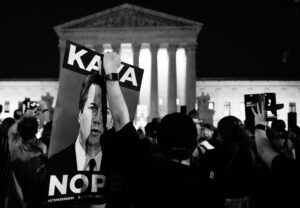
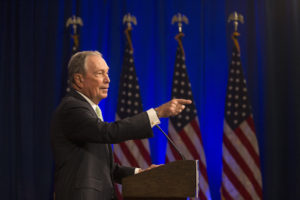
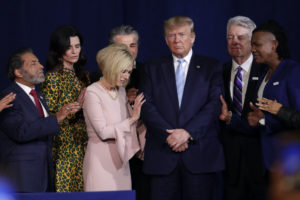

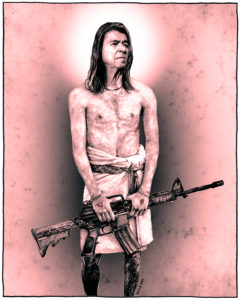
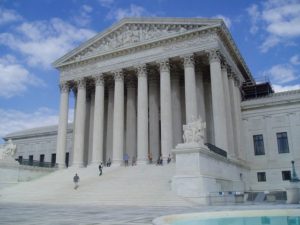
You need to be a supporter to comment.
There are currently no responses to this article.
Be the first to respond.